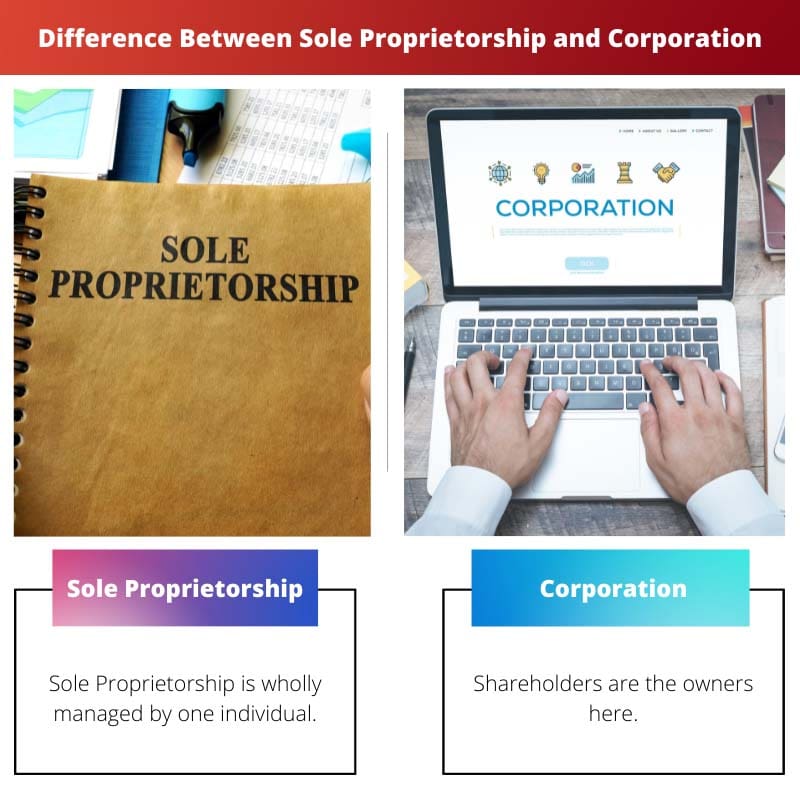Business can be simply defined as the selling and buying of goods and services. There are several types of businesses. Some of them include sole proprietorship, partnership, corporation, LLC.
A sole proprietorship is a type of business handled entirely by one individual. On the other, a corporation is a type of business that is held by the shareholders of a particular company.
Key Takeaways
- A sole Proprietorship is a business model in which an individual owns and operates the business, whereas a Corporation is a legal entity separate from its owners.
- A sole Proprietorship has unlimited liability, meaning the owner is responsible for all business debts and obligations, while a Corporation limits liability for its owners.
- A sole Proprietorship has simpler tax reporting and legal requirements, while Corporation requires more paperwork, regulations, and formalities.
Sole Proprietorship vs Corporation
A sole proprietorship is a type of business owned and operated by one person, where the business and the owner are considered the same legal entity. A corporation is a separate legal entity from its owners, which means that it can own property, enter into contracts, and sue or be sued.

A sole proprietorship is a business managed entirely by an individual. The owner is liable to pay the taxes and is entitled to receive the entire profits of the organization.
Also, the owner is entitled to bear all the losses of the organization. The decision-making authority is owned by the sole proprietor. There is no legal distinction between the owner and the business.
The corporation is a separate entity. Here, the owner and the business are separate. The board of directors manages the organization while the shareholders own the company.
Corporation has distinguished features. Some of them include going concerned, meaning, they continue to exist even after the owners passed away. They have the right to sue and can be sued.
Comparison Table
| Parameters of Comparison | Sole Proprietorship | Corporation |
|---|---|---|
| Meaning | Sole Proprietorship is wholly managed by one individual. | Shareholders are the owners here. |
| Liability | Unlimited liability | Limited liability |
| Existence of business | A sole proprietorship is dissolved after the death of its owner. | The corporation continues to exist even after the death of the owners/shareholders. |
| Minimum members | Only one owner. | C corporation – Unlimited owners, S corporation – Not more than 100. |
| Scope of business | Less scope when compared to a corporation. | Wider scope of business. |
What is Sole Proprietorship?
A sole proprietorship is a business that is managed wholly by an individual. He or she is responsible for the running of the business. Interestingly, there is no mandatory registration that needs to be performed by the sole proprietor.
The sole proprietor is responsible for bearing all the losses of the organization. Also, he or she is solely entitled to receive all the profits of the organization.
With regard to decision making, the sole proprietor need not have to ask anyone for taking decisions within the business organization. The decision-making authority is owned by the sole proprietor himself.
For instance, If A owns a sole proprietorship business and if he wants to introduce new products into his business, he is free to do so, as A need not consult anyone since he is the only owner.
Another advantage of being a sole proprietor is that is the owner has the freedom to control and operate the business organization.
The business and the owner are the same, so if the owner passed away, then the business is dissolved automatically. The capital is also introduced by the owner himself.
Here, there is no involvement of shareholders. In case if the funds are not sufficient for the owner, he may borrow money from his friends or relatives as per his/her wish.
Although, there is one advantage of being a sole proprietor. The sole proprietor is entitled to bear the entire risks of the organization.

What is Corporation?
A corporation refers to big businesses. They are owned by the shareholders of the company. Here, a board of directors is appointed to govern the business organization.
The corporation has limited liability. Unlike a sole proprietorship, the corporation is different from its owners. So, it is a separate legal entity. It has the right to sue and can be sued.
A corporation can enter into a contract. A corporation can acquire and own assets. It can even hire employees to work under the corporation.
Also, the corporation is a going concern, meaning it will continue to exist even after the death of the owners or the shareholders. Here, the scope of business is wider when compared with sole proprietorship and company.
Also, it is advisable to register the corporation under certain rules and regulations (The rules and regulations are varied from country to country).
In India, taxes are levied for the corporation as per the norms of the income tax Act. Unlike a sole proprietorship, the corporation can introduce capital easily. It is because the shareholders buy the shares of the corporation, which leads to capital formation.
Coming to disadvantages, it is difficult to maintain secrecy in a corporation. Also, the decision-making process is quite complicated in a corporation.

Main Differences Between Sole Proprietorship and Corporation
- Sole Proprietorship is managed single-handedly by an individual. On the other hand, a board of directors is appointed for governing purposes, and the shareholders are the owners of the business organization.
- With regard to liability, a sole proprietorship has unlimited liability, whereas a corporation has limited liability.
- Sole Proprietorship is dissolved after the death of its owner. On the other hand, the corporation continues to exist even after the death of the owners or the shareholders since it is a separate legal entity.
- Only one owner is allowed in the case of sole proprietorship. On the other hand, the “C corporation” can have unlimited owners and the “S corporation” can have a maximum of 100 owners.
- There is less scope of business in a sole proprietorship when compared to a corporation.

The explanation of what sole proprietorship entails, including the decision-making authority and profit entitlement, is succinct and well-presented. Similarly, the detailed insights into the distinctive features of corporations provide a balanced understanding of business structures.
Absolutely, a clear understanding of the advantages and drawbacks of each business model is essential for aspiring entrepreneurs. This article effectively conveys the critical elements of sole proprietorship and corporation.
This is a comprehensive and informative overview of the different types of businesses, like sole proprietorship and corporation. It provides clear differences between the two models, such as liability and the scope of the business. The comparison table is particularly useful for anyone looking to understand the nuances of these business structures.
I completely agree, and the explanation of sole proprietorship’s unlimited liability versus the limited liability of a corporation is very helpful. It’s important for individuals starting a business to understand these legal and financial aspects.
The article effectively highlights the essential differences between sole proprietorship and corporation, particularly in terms of liability, ownership, and business scope. It provides a comprehensive understanding of the two business structures and their distinct features.
The legal and financial implications of choosing between a sole proprietorship and corporation are well-articulated in this article. The author provides valuable insights into the complexities of each business model.
Indeed, the explanation of the minimum members required for each model and their existence after the owner’s death is thought-provoking. It helps individuals make informed decisions about the type of business structure that suits their needs.
This article offers a clear and detailed comparison between sole proprietorship and corporation, addressing their legal and operational distinctions. The overview of their meanings, liabilities, and the scope of business is highly informative and beneficial for entrepreneurs.
I couldn’t agree more. The thorough description of sole proprietorship’s simplicity in tax reporting and legal requirements, and corporation’s paperwork and formalities, is particularly enlightening for individuals exploring business opportunities.
The detailed comparison table and the comprehensive delineation of the characteristics of sole proprietorship and corporation offer valuable insights into distinct business structures. This article serves as an exceptional resource for entrepreneurs seeking clarity on business models.
The author presents a detailed comparison of the meaning, liability, and existence of business in both sole proprietorship and corporation. It’s a well-structured and informative piece that facilitates a comprehensive understanding of these business models.
Absolutely, the comprehensive overview of parameters of comparison is essential for guiding individuals in determining the most suitable business structure for their ventures. It provides an insightful analysis of the complexities involved.
The article provides compelling insights into the fundamental differences between sole proprietorship and corporation. It delves into the distinct liability and tax implications, contributing to an enhanced understanding of the complexities involved in choosing a business structure.
Indeed, the examination of the ownership, liability, and scope of businesses in both sole proprietorship and corporation is enlightening. It equips readers with the knowledge necessary to make informed decisions about their business endeavors.
The article meticulously explains the differences between sole proprietorship and corporation, emphasizing their unique characteristics and implications. The in-depth overview of both business models is highly educational and serves as a valuable resource for individuals navigating business decisions.
The analysis of the distinct ownership and management structures in sole proprietorship and corporation sheds light on the complexities of establishing and operating different types of businesses. It’s an insightful piece for entrepreneurs.
I appreciate the concise yet comprehensive explanations of sole proprietorship and corporation. The article effectively outlines the legal, financial, and operational considerations associated with each business model.
The distinction between sole proprietorship and corporation is well-defined in this article. The comparison of parameters and the detailed descriptions of each business model provide a clear understanding of their differences and advantages. It’s a great resource for anyone interested in business structures.
I appreciate the focus on decision-making authority and control in a sole proprietorship, as well as the role of shareholders and board of directors in a corporation. It’s a critical aspect to consider when evaluating different business models.
Absolutely, the emphasis on the legal and tax implications of each model is invaluable. This article presents a thorough analysis of the characteristics and implications of both sole proprietorship and corporation.
The detailed insights into the nature and implications of sole proprietorship and corporation are enlightening. The article effectively underscores the complex legal and operational considerations associated with each business model, serving as a valuable resource for individuals navigating business decisions.
Absolutely, the in-depth analysis of the distinct features and implications of sole proprietorship and corporation is beneficial for aspiring entrepreneurs. It provides a comprehensive understanding of the complexities involved in establishing and operating different business structures.
The article provides an excellent and thorough analysis of the fundamental differences between sole proprietorship and corporation, highlighting their unique characteristics and implications. It offers valuable insights into the complexities of legal, financial, and operational considerations concerning business structures.
Absolutely, the article’s emphasis on the scope of business and the implications of existence after the owner’s death provides a comprehensive understanding of the operational and long-term considerations of each business model.
The comparison of minimum members, scope of business, and the significance of liability in a sole proprietorship and corporation is elucidating. The clear distinctions presented in this article are indispensable for individuals evaluating business models.